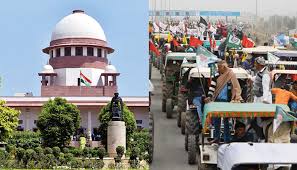Feature
Don’t pass orders on spectrum bidding like Tripura, SC asks HCs

New Delhi: The Supreme Tuesday asked the high courts across the country not to rely on the Tripura High Court order to pass orders interfering with the bidding process for the allocation of 2G spectrum for which auction would be held March 4.
Directing hearing, on Feb 25, of the central government’s plea challenging the high court’s Feb 12 order permitting Reliance Telecom Ltd and Bharti Hexaco to make two bids for spectrum for the northeastern states by modifying tender conditions, a bench of Justice Dipak Misra and Justice Adarsh Kumar Goel asked Attorney General Mukul Rohatgi to place before it any matter relating 2G bidding before the high courts.
The court said that no adjournment will be granted on Feb 25 as Rohatgi described the high court order as “astounding” and “completely unacceptable”, saying what was at “stake was the revenue of Rs.1 lakh crore and any interference by the court would make people shy away”.
The attorney general told the court that by the high court order, the entire bidding process is set to be put at nought and writ petitions are being filed all over.
“What is good for the northeast is good for the rest of the country,” Rohatgi said pointing to the spate of petitions that would be generated after Tripura High Court order.
Senior counsel P.Chidambram, who appeared for Reliance Telecom, contested the submission by attorney general saying that all that the Tripura High Court had permitted was the filing of two application one online and other offline for 4.4 MHz and other for permitted minimum 5 MHz spectrum in 900 MHz bands.
He told the court that it was an order for making applications and has nothing to do with bidding which would take place on March 4.
Confronting Rohatgi with the views of the Telecom Regulatory Authority of India (TRAI), Chidambram told the court: “It is not his view, nor my view. Twice TRAI had recommended putting to auction a minimum of 4.4 MHz of spectrum in 900 MHz.”
He noted that the TRAI reiterated its recommendation for the auction of a minimum of 4.4 MHz of spectrum after the government sought the reconsideration of its earlier recommendations.
Chidambram told the court that today there are two operators – Reliance Telecom and Bharti Hexacom – providing services and each having 4.4 MHz of spectrum. He said that if the government continues to insist on allocating a minimum of 5 MHz spectrum to one bidder, then it would mean that the other operator will have to shut down its operations.
He said that besides one of the service providers faced the prospect of shutting down, the balance of 3.8 MHz of spectrum would remain unutilised as it would not be put under hammer in the present round of auctioning. “This is a great disservice to the people of northeast,” he contended.
At this, Justice Misra asked: “How are you concerned (what will happen to 3.8 MHz spectrum). Why you are assuming that somebody will not bid for more spectrum. What right you have to go on with spectrum in 900 MHz band. Can we adjudicate all this?”
In response, Rohatgi said: “According to me no right is vested in them” and “you are not in public interest but in private interest”. As Chidambram said that “we are in public service”, he said: “It is your pocket interest.”
Rohatgi contested Chidambram’s position that if one service provider succeeds in getting 5 MHz of spectrum, then the other will have to shut down its operation in the northeast.
He said that besides 900 MHz band, Reliance Telecom was also operating in 1800 MHz, 800 MHz and 2100 MHz band and Bharti Hexacom was operating in 1800 MHz and 2100 MHz band.
Entertainment
Meghalaya Reserves Legalized Gambling and Sports Betting for Tourists

The State Scores Extra High on Gaming-Friendly Industry Index
Meghalaya scored 92.85 out of 100 possible points in a Gaming Industry Index and proved to be India’s most gaming-friendly state following its recent profound legislation changes over the field allowing land-based and online gaming, including games of chance, under a licensing regime.
The index by the UK India Business Council (UKIBC) uses a scale of 0 to 100 to measure the level of legalisation on gambling and betting achieved by a state based on the scores over a set of seven different games – lottery, horse racing, betting on sports, poker, rummy, casino and fantasy sports
Starting from February last year, Meghalaya became the third state in India’s northeast to legalise gambling and betting after Sikkim and Nagaland. After consultations with the UKIBC, the state proceeded with the adoption of the Meghalaya Regulation of Gaming Act, 2021 and the nullification of the Meghalaya Prevention of Gambling Act, 1970. Subsequently in December, the Meghalaya Regulation of Gaming Rules, 2021 were notified and came into force.
All for the Tourists
The move to legalise and license various forms of offline and online betting and gambling in Meghalaya is aimed at boosting tourism and creating jobs, and altogether raising taxation revenues for the northeastern state. At the same time, the opportunities to bet and gamble legally will be reserved only for tourists and visitors.
“We came out with a Gaming Act and subsequently framed the Regulation of Gaming Rules, 2021. The government will accordingly issue licenses to operate games of skill and chance, both online and offline,” said James P. K. Sangma, Meghalaya State Law and Taxation Minister speaking in the capital city of Shillong. “But the legalized gambling and gaming will only be for tourists and not residents of Meghalaya,” he continued.
To be allowed to play, tourists and people visiting the state for work or business purposes will have to prove their non-resident status by presenting appropriate documents, in a process similar to a bank KYC (Know Your Customer) procedure.
Meghalaya Reaches Out to a Vast Market
With 140 millions of people in India estimated to bet regularly on sports, and a total of 370 million desi bettors around prominent sporting events, as per data from one of the latest reports by Esse N Videri, Meghalaya is set to reach out and take a piece of a vast market.
Estimates on the financial value of India’s sports betting market, combined across all types of offline channels and online sports and cricket predictions and betting platforms, speak about amounts between $130 and $150 billion (roughly between ₹9.7 and ₹11.5 lakh crore).
Andhra Pradesh, Telangana and Delhi are shown to deliver the highest number of bettors and Meghalaya can count on substantial tourists flow from their betting circles. The sports betting communities of Karnataka, Maharashtra, Uttar Pradesh and Haryana are also not to be underestimated.
Among the sports, cricket is most popular, registering 68 percent of the total bet count analyzed by Esse N Videri. Football takes second position with 11 percent of the bets, followed by betting on FIFA at 7 percent and on eCricket at 5 percent. The last position in the Top 5 of popular sports for betting in India is taken by tennis with 3 percent of the bet count.
Local Citizens will Still have Their Teer Betting
Meghalaya residents will still be permitted to participate in teer betting over arrow-shooting results. Teer is a traditional method of gambling, somewhat similar to a lottery draw, and held under the rules of the Meghalaya Regulation of the Game of Arrow Shooting and the Sale of Teer Tickets Act, 2018.
Teer includes bettors wagering on the number of arrows that reach the target which is placed about 50 meters away from a team of 20 archers positioned in a semicircle.
The archers shoot volleys of arrows at the target for ten minutes, and players place their bets choosing a number between 0 and 99 trying to guess the last two digits of the number of arrows that successfully pierce the target.
If, for example, the number of hits is 256, anyone who has bet on 56 wins an amount eight times bigger than their wager.





















